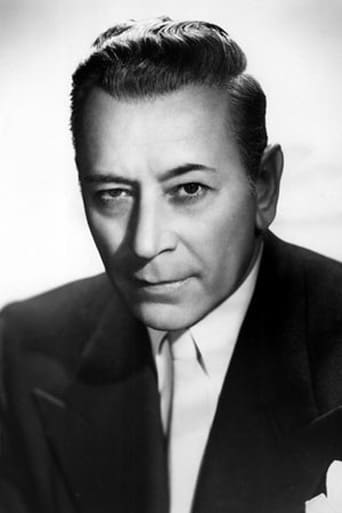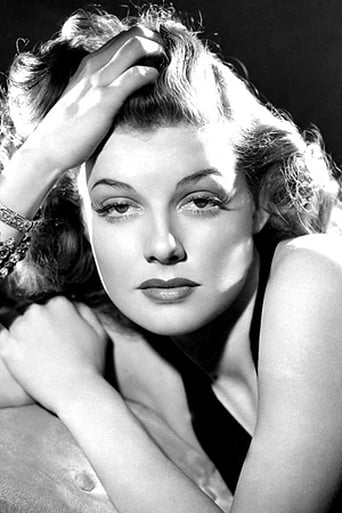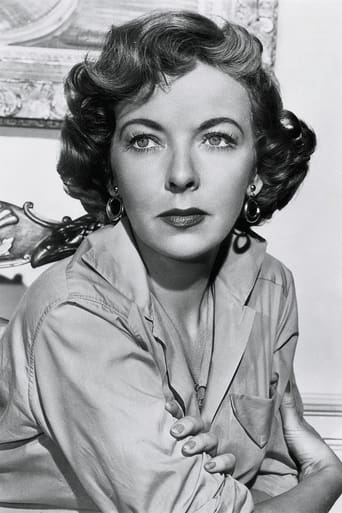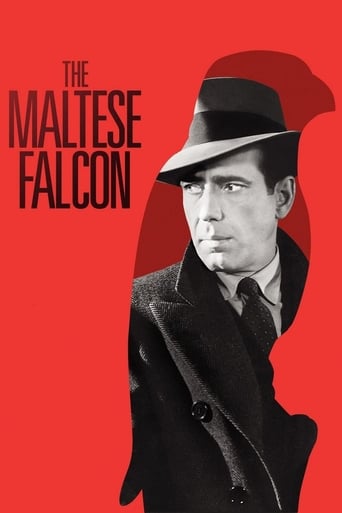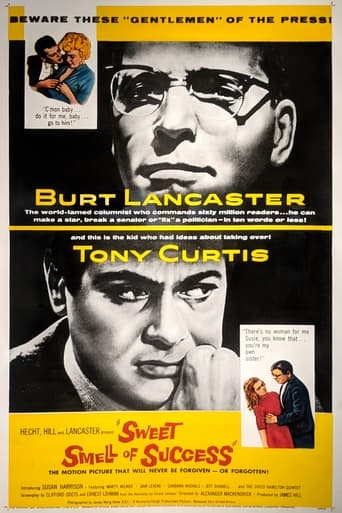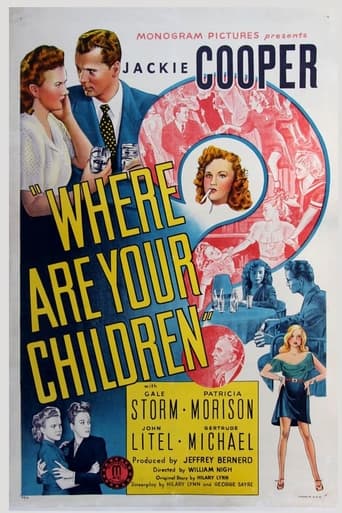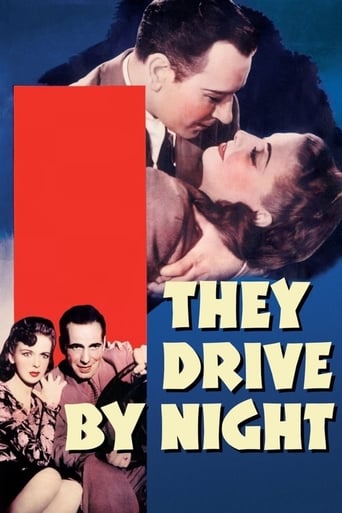
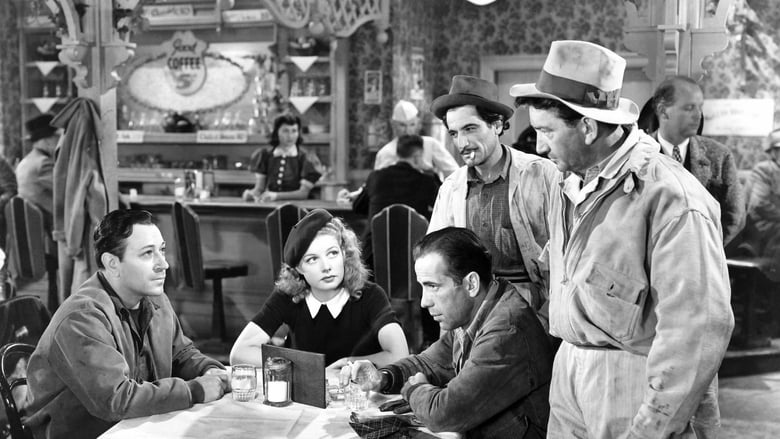
They Drive by Night (1940)
Joe and Paul Fabrini are Wildcat, or independent, truck drivers who have their own small one-truck business. The Fabrini boys constantly battle distributors, rivals and loan collectors, while trying to make a success of their transport company.
Watch Trailer
Cast
Similar titles
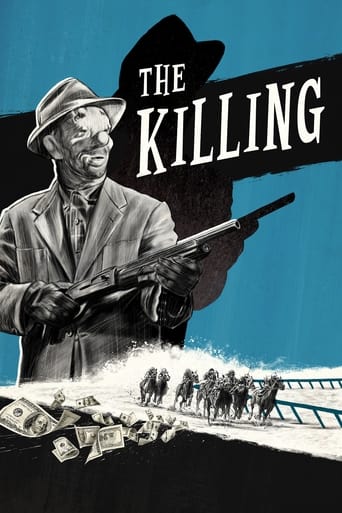
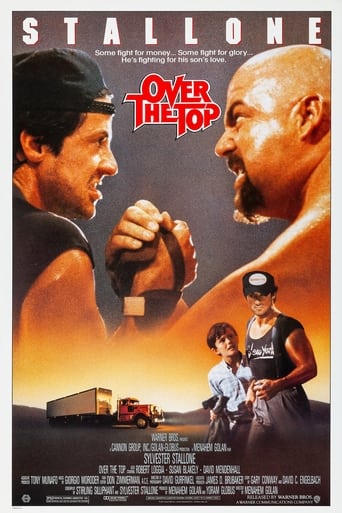
Reviews
Nice effects though.
Just perfect...
At first rather annoying in its heavy emphasis on reenactments, this movie ultimately proves fascinating, simply because the complicated, highly dramatic tale it tells still almost defies belief.
It is an exhilarating, distressing, funny and profound film, with one of the more memorable film scores in years,
An entertaining drama.Starts out as a trucking movie, the little independent operator vs the big company, and ends as a murder-drama, even psychological drama. While it does seem to suffer from not having a single focus - there are too many sub-plots going on at the same time - it is never dull and always entertaining. Pacing is good.Solid performance from George Raft in the lead role. Humphrey Bogart had a more supporting role but seems to have more presence than Raft whenever they are in the same scene.Good support from Ann Sheridan, Ida Lupino and Alan Hale.
"They Drive by Night" starts as a powerful blue-collar drama involving two embattled truck drivers, George Raft and Humphrey Bogart as siblings Joe and Paul Brasini, and it ends like a traditional film-noir with Ida Lupino as an over-possessive femme fatale and George Raft as the unfortunate object of her twisted affection. Raft is the common link between two stories that could've been easily separate, making the title even more questionable. In French, it's "A Dangerous Woman", a wiser choice given how prominent Ida Lupino gets in the second half of the film, delivering the most powerful performance among its star-studded cast.But let's get back to the first act, it is a brilliant social commentary about the hardened conditions of truck drivers, traveling in pairs, switching roles in order to gain some sleep, the dialogues cut straight to your heart, the male brotherhood, the solidarity between drivers, their economical struggle while depending on crooked bosses, no mention of unions or drivers' right, it's not "Hoffa" but more of a Steinbeck-like "Wheels of Wrath" with some heart-pounding sequences à la "Wages of Fear". The part featuring Bogart trying to resist to sleep left me on the edge, having just experienced a similar moment while driving alone on a monotonous road, I knew how it feels to feel your eyes heavy and then close them enough to see you getting off the road.The first act is a riveting experience, and it wouldn't have hurt the story to keep on that direction. I loved Paul's melancholic monologues about missing his wife, getting to bed, this speaks something powerful about the way these men lived, they didn't need money to live fancy lives, sleeping was the cherished treasure. And like modern-day explorers or sailors, their benevolent wives waited for them, expecting the worse, for it wasn't uncommon to some drivers who dreamed of sleeping to sleep once and for all. The film oscillates between dramatic moments and some comic reliefs, through Roscoe Karne as the driver who constantly wastes his pay on pinball's. But don't get it wrong, this isn't just a man's film, women play a significant part, and this is how fresh and modern that first act feels.Ann Sheridan plays her usual wisecracking roles, with the waitress who'll always outsmart all the witty quirks addressed to her, she's not just an eye-catching red head, she sure knows how to catch a man's heart, and the no-nonsense look George Raft keeps on her says a lot. But it's Gale Page who caught my heart as Paul's wife. She begged him for children believing it would at least conceal her loneliness, but Paul doesn't feel ready. Her speech in the hospital after Paul lost his right arm is intelligently thought-provoking; she's glad he lost an arm, it's a small price to pay if it could finally earn her peace of mind, and a stability in her couple. It's not cynical, it's only a tough reaction to one of the toughest rackets ever, one that make gangster look like wimps.And now I guess it's time to get to the second half, to Ida Lupino. Her Lana Carlsen is not the dedicated housewife, or the street-wise down-to-earth girl, but the ultimate gold-digger with only contempt for her jovial and fun-loving husband, Alan Hale as Ed Carlsen an old friend of Joe who obviously succeeded. She must've loved something in Ed, and it's not his age, his bonhomie, his looks, his childish puns, the way he keeps laughing at them, or his incomparable talent as a party animal, so she's a venal woman, and the only spot in her heart is for Joe. By the way, Al Hale gave a scene-stealing performance a lovable buffoon, and his brutal murder was certainly a turning point in the film. We're plunged in an ocean of darkness as soon as good old Ed leaves the screen.The murder, memorable for its use of electric eyes, borrowed some elements from Bette Davis' "Bordertown" to boost Lupino's reputation as a new Davis. And somewhat, she deserved that publicity because she added a tragic dimension to her vileness, and her portrayal of mental dementia is still efficient even from a modern perspective. But what was the point to feature a murder so late in the film, and rushed up the rest in less than twenty minutes. So many things happen events lose their impact: Joe, after working for Ed, becomes Lana's partner, business works, but she's so wrapped up by her ego she admits her murder after learning about his marriage with Cassie (Ann Sheridan). She then, accuses him of setting up the whole scheme but on trial, she breakdowns and repeat anxiously : "The doors made me do it" (the film's defining moment)While, it could have done without that manic laughter, her performance was the highlight of the film and it was one of the most despicable female villains ever, but there's nothing Joe ever does: he owes his freedom to Lana's breakdown, his job to their partnership and to Ed's friendship, his figure is so diluted that you wonder what she found in him in the first place, was that man worth that waste? Sure, there's Lupino's performance but I'm not sure it was worth abruptly cutting on that powerful truck story, or maybe with a stronger lead I have nothing against Raft, but as the film's top-biller, he's clearly out-shadowed by all the other protagonists. My DVD of the film belongs to the Bogart's collection and it couldn't have been more misleading: an elegant Bogart drives a car while holding Lupino, with Raft sitting next. Thankfully, this is one of Bogart's last performances as a sidekick, and Raft's greatest contribution to cinema was to allow his career to take off by turning down "High Sierra", "The Maltese Falcon" and "Casablanca". After "High Sierra", Bogart would never sit on the front side, he'll drive his movies by himself.
George Raft (Joe) and Humphrey Bogart (Paul) play brothers who earn their living as truckers. While Raft is the ambitious brother, Bogey would like to settle into family life. Once Raft meets up with friend Alan Hale (Ed) and is given a job, Ida Lupino (Lana) shows up as Hale's wife. And then the film gets interesting. She's got the hots for Raft but he's not interested, preferring ex-waitress Anne Sheridan (Cassie) who he intends to marry. Uh-oh Lupino is a psycho The film takes an age to get going. The first half is totally wasted as we get a film that basically tells us that everyone likes George Raft. Can't stand films like that where everywhere a character goes he is greeted with a "hi, how are you doing?" We also have to suffer with comedy characters in the first half, with a special mention to the complete idiot that is Roscoe Karns. He's not lovable or funny, he's 100% irritating. Check out his embarrassing facial expressions as he plays pinball! No-one plays pinball like that. The best thing in the first half of the film is Ann Sheridan and her dialogue – it's quality. Raft and Bogey are OK, but the film isn't particularly interesting at this point. It's about trucks, for goodness sake! And then .what we have been waiting for .Lupino makes her entrance. And it's her film from that moment on. It's basically good whenever she is on screen. She displays the greater acting ability and provides the tension in the film. Her scene in the garage is a standout. As is the moment she comes face to face with Sheridan.Curiously, as Lupino emerges in the second half, Sheridan seems to have a rather unconvincing transformation into a goody two-shoes homely type. It doesn't work. Nor does the ending. Lupino's courtroom appearance is unconvincing as is the terribly corny ending with smiles, back-pats and winking. As if something ingenious has been conjured up. What really happens afterwards is Lupino returns after listening to the Doors, especially "Riders on the Storm", for about a zillion years. And she's badder than ever! The film just wouldn't be interesting without Lupino's presence, and she saves it from being a boring truck-driving film.
Good movie, except it's overridden with plot, about two brothers in the trucking industry and the perils they encounter. One of them (played by George Raft) gets a job at a trucking firm, only to find the wife of the boss still playing footsy with him (they had a thing in the past). He's got a dame now! The trucker's boss wife kills the boss and makes the trucker the new boss! Oh, there's still a lot lot more to be told, but as I said, this seems to be a movie with plenty of ideas, and only 90 minutes to tell it in. The MAIN plot (which, yes, is taken from the Bette Davis movie Bordertown) doesn't kick in til the final half hour of the movie. Still entertaining to watch though.
